Unit 2 Why don’t you talk to your parents? Section B (1a-2e)学案(含答案)2024-2025学年英语鲁教版八年级上册
文档属性
| 名称 | Unit 2 Why don’t you talk to your parents? Section B (1a-2e)学案(含答案)2024-2025学年英语鲁教版八年级上册 | 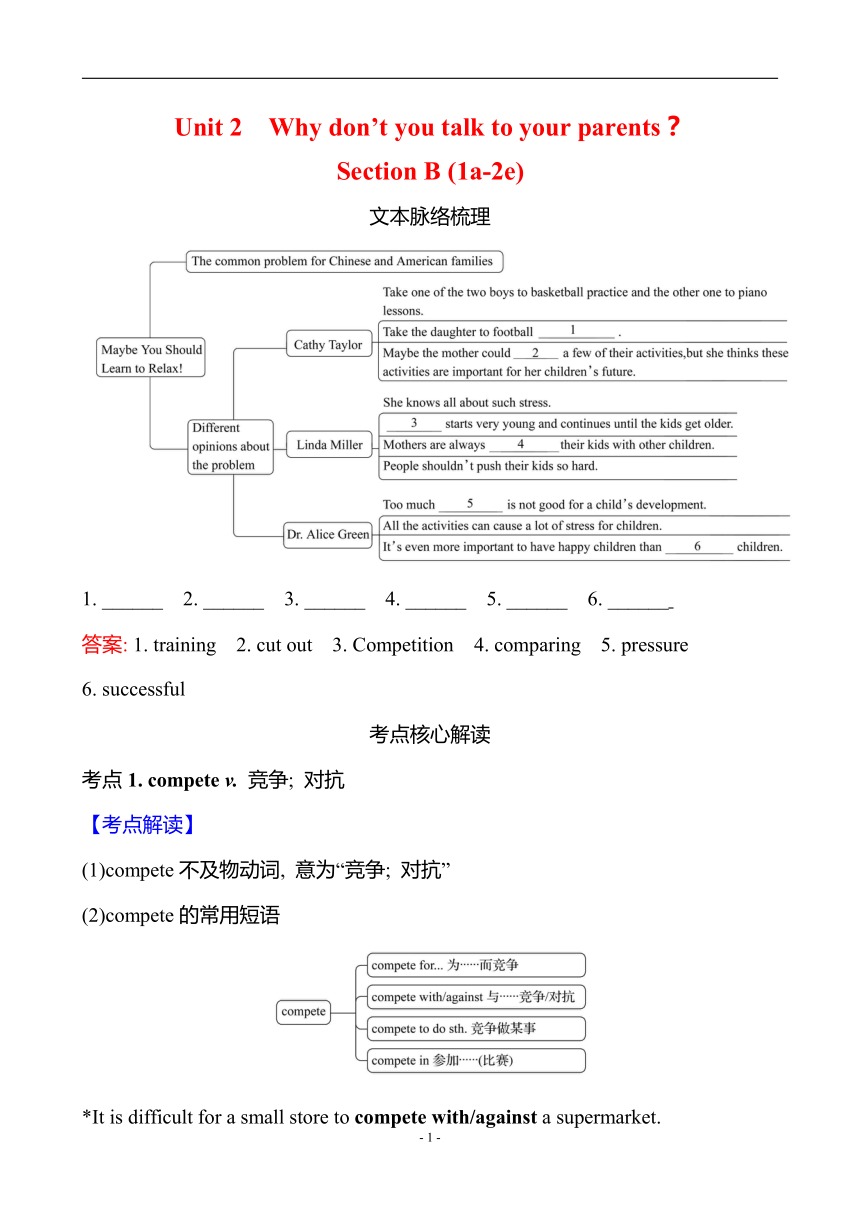 | |
| 格式 | docx | ||
| 文件大小 | 373.1KB | ||
| 资源类型 | 教案 | ||
| 版本资源 | 鲁教版 | ||
| 科目 | 英语 | ||
| 更新时间 | 2024-06-13 14:24:15 | ||
图片预览

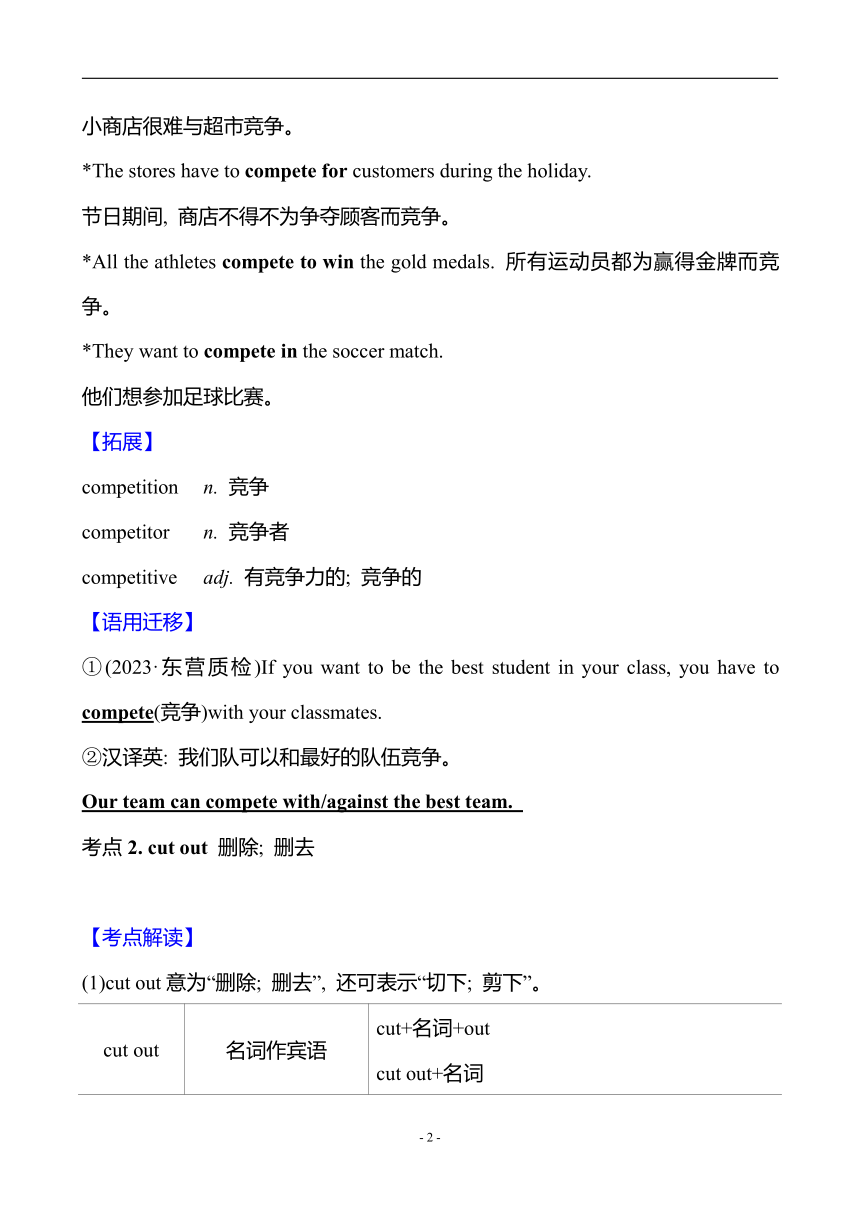
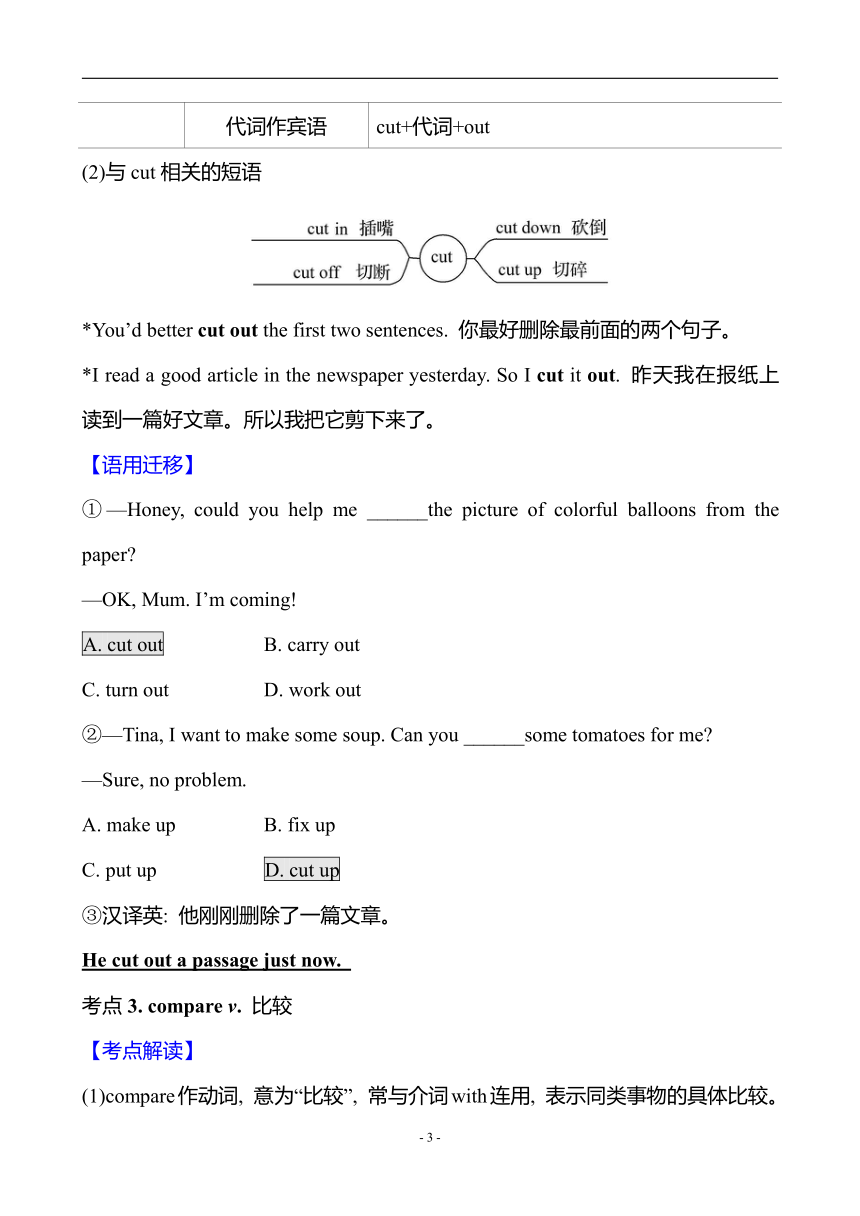
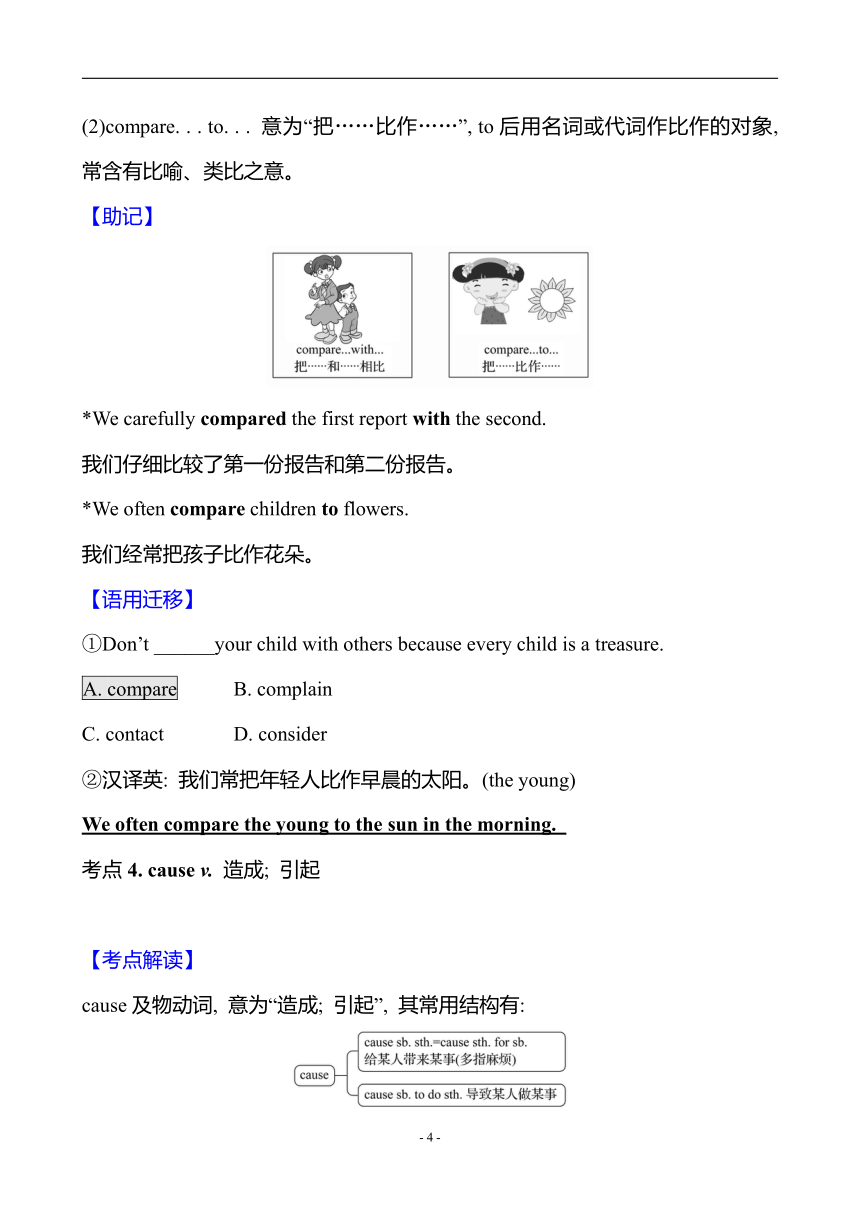
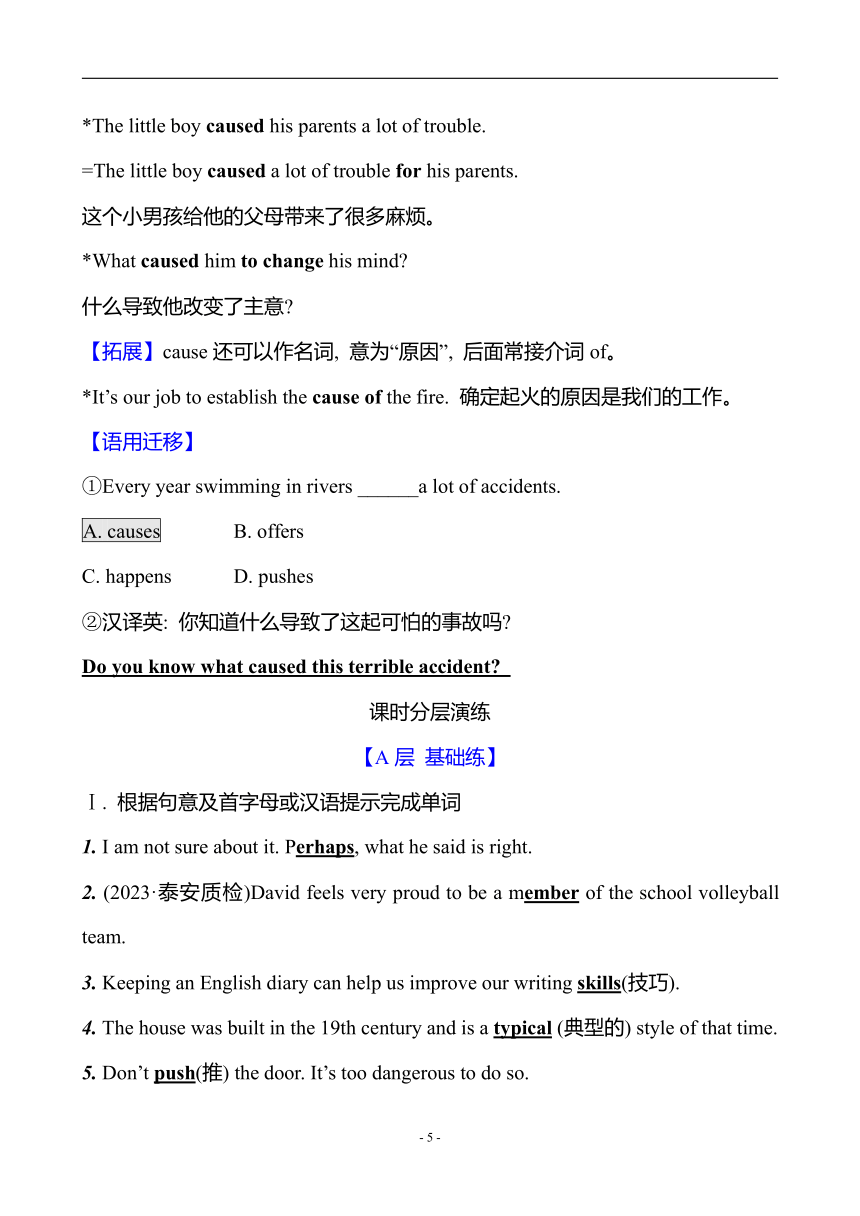
文档简介
Unit 2 Why don’t you talk to your parents?
Section B (1a-2e)
文本脉络梳理
1. ______ 2. ______ 3. ______ 4. ______ 5. ______ 6. ______
答案: 1. training 2. cut out 3. Competition 4. comparing 5. pressure
6. successful
考点核心解读
考点1. compete v. 竞争; 对抗
【考点解读】
(1)compete不及物动词, 意为“竞争; 对抗”
(2)compete的常用短语
*It is difficult for a small store to compete with/against a supermarket.
小商店很难与超市竞争。
*The stores have to compete for customers during the holiday.
节日期间, 商店不得不为争夺顾客而竞争。
*All the athletes compete to win the gold medals. 所有运动员都为赢得金牌而竞争。
*They want to compete in the soccer match.
他们想参加足球比赛。
【拓展】
competition n. 竞争
competitor n. 竞争者
competitive adj. 有竞争力的; 竞争的
【语用迁移】
①(2023·东营质检)If you want to be the best student in your class, you have to compete(竞争)with your classmates.
②汉译英: 我们队可以和最好的队伍竞争。
Our team can compete with/against the best team.
考点2. cut out 删除; 删去
【考点解读】
(1)cut out意为“删除; 删去”, 还可表示“切下; 剪下”。
cut out 名词作宾语 cut+名词+out
cut out+名词
代词作宾语 cut+代词+out
(2)与cut相关的短语
*You’d better cut out the first two sentences. 你最好删除最前面的两个句子。
*I read a good article in the newspaper yesterday. So I cut it out. 昨天我在报纸上读到一篇好文章。所以我把它剪下来了。
【语用迁移】
①—Honey, could you help me ______the picture of colorful balloons from the paper
—OK, Mum. I’m coming!
A. cut out B. carry out
C. turn out D. work out
②—Tina, I want to make some soup. Can you ______some tomatoes for me
—Sure, no problem.
A. make up B. fix up
C. put up D. cut up
③汉译英: 他刚刚删除了一篇文章。
He cut out a passage just now.
考点3. compare v. 比较
【考点解读】
(1)compare作动词, 意为“比较”, 常与介词with连用, 表示同类事物的具体比较。
(2)compare. . . to. . . 意为“把……比作……”, to后用名词或代词作比作的对象, 常含有比喻、类比之意。
【助记】
*We carefully compared the first report with the second.
我们仔细比较了第一份报告和第二份报告。
*We often compare children to flowers.
我们经常把孩子比作花朵。
【语用迁移】
①Don’t ______your child with others because every child is a treasure.
A. compare B. complain
C. contact D. consider
②汉译英: 我们常把年轻人比作早晨的太阳。(the young)
We often compare the young to the sun in the morning.
考点4. cause v. 造成; 引起
【考点解读】
cause及物动词, 意为“造成; 引起”, 其常用结构有:
*The little boy caused his parents a lot of trouble.
=The little boy caused a lot of trouble for his parents.
这个小男孩给他的父母带来了很多麻烦。
*What caused him to change his mind
什么导致他改变了主意
【拓展】cause还可以作名词, 意为“原因”, 后面常接介词of。
*It’s our job to establish the cause of the fire. 确定起火的原因是我们的工作。
【语用迁移】
①Every year swimming in rivers ______a lot of accidents.
A. causes B. offers
C. happens D. pushes
②汉译英: 你知道什么导致了这起可怕的事故吗
Do you know what caused this terrible accident
课时分层演练
【A层 基础练】
Ⅰ. 根据句意及首字母或汉语提示完成单词
1. I am not sure about it. Perhaps, what he said is right.
2. (2023·泰安质检)David feels very proud to be a member of the school volleyball team.
3. Keeping an English diary can help us improve our writing skills(技巧).
4. The house was built in the 19th century and is a typical (典型的) style of that time.
5. Don’t push(推) the door. It’s too dangerous to do so.
Ⅱ. 用所给词的适当形式填空
1. Doctors say exercise is good for a child’s development(develop).
2. She has a quick(quickly) breakfast every morning and then goes to school.
3. (2023·东营质检)Noise pollution can cause people to become(become) sick, so our government has done something useful to stop it.
4. Competition(compete) between children brings them a lot of pressure.
5. The teenagers have to work hard because of the pressure(press) from their parents.
Ⅲ. 完成句子
1. 不要总是拿你的儿子和别的孩子进行比较。
Don’t always compare your son with other children.
2. 当我还是个小女孩的时候, 我就对画画着迷。
I was crazy about painting when I was a little girl.
3. 由于时间有限, 电视台删除了这档节目。
Because time was limited, the TV station cut out this program.
4. 鲍勃没听见我说话, 继续向学校走去。
Bob didn’t hear me and continued walking to school.
5. 不要听他的。你应该独立思考。
Don’t listen to him. You should think for yourself.
【B层 能力练】
Ⅳ. 阅读理解
Naturally, American schoolchildren love holidays. And they get a lot of them each year. Besides having national holidays such as Thanksgiving and Presidents’ Day off from school, students get longer breaks in the spring and during the summer holidays. In fact, kids in the US only go to school for about 180 days a year. To students, holidays are perfect. However, parents think there are advantages(益处) and disadvantages.
On the one hand, school holidays allow families to spend time together. Many American parents take time off from work during June, July or August to travel with their children on vacation either in the US or in a foreign country. On the other hand, schoolchildren get much more time off school than parents get vacation time. This means that parents with young children may have to pay more in babysitting(代人临时照顾小孩) or daycare costs. As well, the long summer holidays mean that students sometimes get bored.
Besides going on trips with their parents, American students enjoy taking part in different kinds of activities during the holidays. For example, some kids enjoy summer camps and outdoor adventure holidays. Such trips are great for adventurous students. They also have a lot to offer students who aren’t usually interested in traditional PE activities. You can do courses in survival skills, for example, students learn how to make a camp in the forest, which wild food they can eat and how to find their way back to the center.
Students who are not excited about summer camps and outdoor adventure may take part in courses in computer game design, film-making and photography during the holidays. Finally, the traditional school trip to foreign countries is always popular. Students can practice their foreign language skills and experience everyday life in a different culture.
1. How long are kids in the US at school every year
A. About 180 days. B. About 200 days.
C. About 280 days. D. About 300 days.
2. What does the underlined word “They” refer to (指的是) in Paragraph 3
A. Parents.
B. Different traditional PE activities.
C. Some kids.
D. Summer camps and outdoor adventure holidays.
3. The underlined word “survival” in Paragraph 3 means “______” in Chinese.
A. 日常 B. 原始 C. 生存 D. 奇特
4. Which of the following is TRUE
A. Both parents and students think school holidays are perfect.
B. Parents can take care of their young children during all the holidays.
C. American students enjoy taking part in different
kinds of activities during holidays.
D. Students don’t like to have school trips to foreign countries during holidays.
5. What would be the best title for the passage
A. School trips in the US
B. School holidays in the US
C. School activities in the US
D. Outdoor adventures in the US
Ⅴ. 任务型阅读
(2023·东营期末)
It was 6: 00 on a Monday morning. With his books in his bag, 13-year-old James Mwangi was on his way to school, the Mcedo-Beijing School in a slum(贫民窟)in Nairobi(内罗毕), the capital of Kenya. This school was built in 2001 with the help of China, for children from poor families.
After getting to school, Mwangi went straight to his class to do his classwork. It is usual that pupils in this school prepare for their lessons before the teacher comes.
3. To study in the school was once a dream for the poor boy. His mother made a living by washing clothes for others. Some days she took home nothing, and some days she could get about $3—it was hard to buy them a full meal for a day.
Before joining the Mcedo-Beijing School, Mwangi was at home with his seven brothers, collecting garbage (垃圾). The school is giving these children hope for the future by providing a chance to get education.
4. “For me, education is the best gift, ” said Mwangi.
A. 根据短文内容简要回答问题。
1. Which country helped build Mwangi’s school
China.
2. How did Mwangi’s mother make a living
By washing clothes for others.
B. 将短文中画线的句子译成汉语。
3. 在学校读书曾是这个贫穷的男孩的梦想。
4. 对我来说, 教育是最好的礼物
C. 请给短文拟一个适当的英文标题。
5. Education is the best gift
【词汇积累】
disadvantage / d s d vɑ nt d / n. 缺点; 不利因素; 障碍; 不便之处
adventure / d vent (r)/ n. 冒险; 奇遇; 冒险经历
- 10 -
Section B (1a-2e)
文本脉络梳理
1. ______ 2. ______ 3. ______ 4. ______ 5. ______ 6. ______
答案: 1. training 2. cut out 3. Competition 4. comparing 5. pressure
6. successful
考点核心解读
考点1. compete v. 竞争; 对抗
【考点解读】
(1)compete不及物动词, 意为“竞争; 对抗”
(2)compete的常用短语
*It is difficult for a small store to compete with/against a supermarket.
小商店很难与超市竞争。
*The stores have to compete for customers during the holiday.
节日期间, 商店不得不为争夺顾客而竞争。
*All the athletes compete to win the gold medals. 所有运动员都为赢得金牌而竞争。
*They want to compete in the soccer match.
他们想参加足球比赛。
【拓展】
competition n. 竞争
competitor n. 竞争者
competitive adj. 有竞争力的; 竞争的
【语用迁移】
①(2023·东营质检)If you want to be the best student in your class, you have to compete(竞争)with your classmates.
②汉译英: 我们队可以和最好的队伍竞争。
Our team can compete with/against the best team.
考点2. cut out 删除; 删去
【考点解读】
(1)cut out意为“删除; 删去”, 还可表示“切下; 剪下”。
cut out 名词作宾语 cut+名词+out
cut out+名词
代词作宾语 cut+代词+out
(2)与cut相关的短语
*You’d better cut out the first two sentences. 你最好删除最前面的两个句子。
*I read a good article in the newspaper yesterday. So I cut it out. 昨天我在报纸上读到一篇好文章。所以我把它剪下来了。
【语用迁移】
①—Honey, could you help me ______the picture of colorful balloons from the paper
—OK, Mum. I’m coming!
A. cut out B. carry out
C. turn out D. work out
②—Tina, I want to make some soup. Can you ______some tomatoes for me
—Sure, no problem.
A. make up B. fix up
C. put up D. cut up
③汉译英: 他刚刚删除了一篇文章。
He cut out a passage just now.
考点3. compare v. 比较
【考点解读】
(1)compare作动词, 意为“比较”, 常与介词with连用, 表示同类事物的具体比较。
(2)compare. . . to. . . 意为“把……比作……”, to后用名词或代词作比作的对象, 常含有比喻、类比之意。
【助记】
*We carefully compared the first report with the second.
我们仔细比较了第一份报告和第二份报告。
*We often compare children to flowers.
我们经常把孩子比作花朵。
【语用迁移】
①Don’t ______your child with others because every child is a treasure.
A. compare B. complain
C. contact D. consider
②汉译英: 我们常把年轻人比作早晨的太阳。(the young)
We often compare the young to the sun in the morning.
考点4. cause v. 造成; 引起
【考点解读】
cause及物动词, 意为“造成; 引起”, 其常用结构有:
*The little boy caused his parents a lot of trouble.
=The little boy caused a lot of trouble for his parents.
这个小男孩给他的父母带来了很多麻烦。
*What caused him to change his mind
什么导致他改变了主意
【拓展】cause还可以作名词, 意为“原因”, 后面常接介词of。
*It’s our job to establish the cause of the fire. 确定起火的原因是我们的工作。
【语用迁移】
①Every year swimming in rivers ______a lot of accidents.
A. causes B. offers
C. happens D. pushes
②汉译英: 你知道什么导致了这起可怕的事故吗
Do you know what caused this terrible accident
课时分层演练
【A层 基础练】
Ⅰ. 根据句意及首字母或汉语提示完成单词
1. I am not sure about it. Perhaps, what he said is right.
2. (2023·泰安质检)David feels very proud to be a member of the school volleyball team.
3. Keeping an English diary can help us improve our writing skills(技巧).
4. The house was built in the 19th century and is a typical (典型的) style of that time.
5. Don’t push(推) the door. It’s too dangerous to do so.
Ⅱ. 用所给词的适当形式填空
1. Doctors say exercise is good for a child’s development(develop).
2. She has a quick(quickly) breakfast every morning and then goes to school.
3. (2023·东营质检)Noise pollution can cause people to become(become) sick, so our government has done something useful to stop it.
4. Competition(compete) between children brings them a lot of pressure.
5. The teenagers have to work hard because of the pressure(press) from their parents.
Ⅲ. 完成句子
1. 不要总是拿你的儿子和别的孩子进行比较。
Don’t always compare your son with other children.
2. 当我还是个小女孩的时候, 我就对画画着迷。
I was crazy about painting when I was a little girl.
3. 由于时间有限, 电视台删除了这档节目。
Because time was limited, the TV station cut out this program.
4. 鲍勃没听见我说话, 继续向学校走去。
Bob didn’t hear me and continued walking to school.
5. 不要听他的。你应该独立思考。
Don’t listen to him. You should think for yourself.
【B层 能力练】
Ⅳ. 阅读理解
Naturally, American schoolchildren love holidays. And they get a lot of them each year. Besides having national holidays such as Thanksgiving and Presidents’ Day off from school, students get longer breaks in the spring and during the summer holidays. In fact, kids in the US only go to school for about 180 days a year. To students, holidays are perfect. However, parents think there are advantages(益处) and disadvantages.
On the one hand, school holidays allow families to spend time together. Many American parents take time off from work during June, July or August to travel with their children on vacation either in the US or in a foreign country. On the other hand, schoolchildren get much more time off school than parents get vacation time. This means that parents with young children may have to pay more in babysitting(代人临时照顾小孩) or daycare costs. As well, the long summer holidays mean that students sometimes get bored.
Besides going on trips with their parents, American students enjoy taking part in different kinds of activities during the holidays. For example, some kids enjoy summer camps and outdoor adventure holidays. Such trips are great for adventurous students. They also have a lot to offer students who aren’t usually interested in traditional PE activities. You can do courses in survival skills, for example, students learn how to make a camp in the forest, which wild food they can eat and how to find their way back to the center.
Students who are not excited about summer camps and outdoor adventure may take part in courses in computer game design, film-making and photography during the holidays. Finally, the traditional school trip to foreign countries is always popular. Students can practice their foreign language skills and experience everyday life in a different culture.
1. How long are kids in the US at school every year
A. About 180 days. B. About 200 days.
C. About 280 days. D. About 300 days.
2. What does the underlined word “They” refer to (指的是) in Paragraph 3
A. Parents.
B. Different traditional PE activities.
C. Some kids.
D. Summer camps and outdoor adventure holidays.
3. The underlined word “survival” in Paragraph 3 means “______” in Chinese.
A. 日常 B. 原始 C. 生存 D. 奇特
4. Which of the following is TRUE
A. Both parents and students think school holidays are perfect.
B. Parents can take care of their young children during all the holidays.
C. American students enjoy taking part in different
kinds of activities during holidays.
D. Students don’t like to have school trips to foreign countries during holidays.
5. What would be the best title for the passage
A. School trips in the US
B. School holidays in the US
C. School activities in the US
D. Outdoor adventures in the US
Ⅴ. 任务型阅读
(2023·东营期末)
It was 6: 00 on a Monday morning. With his books in his bag, 13-year-old James Mwangi was on his way to school, the Mcedo-Beijing School in a slum(贫民窟)in Nairobi(内罗毕), the capital of Kenya. This school was built in 2001 with the help of China, for children from poor families.
After getting to school, Mwangi went straight to his class to do his classwork. It is usual that pupils in this school prepare for their lessons before the teacher comes.
3. To study in the school was once a dream for the poor boy. His mother made a living by washing clothes for others. Some days she took home nothing, and some days she could get about $3—it was hard to buy them a full meal for a day.
Before joining the Mcedo-Beijing School, Mwangi was at home with his seven brothers, collecting garbage (垃圾). The school is giving these children hope for the future by providing a chance to get education.
4. “For me, education is the best gift, ” said Mwangi.
A. 根据短文内容简要回答问题。
1. Which country helped build Mwangi’s school
China.
2. How did Mwangi’s mother make a living
By washing clothes for others.
B. 将短文中画线的句子译成汉语。
3. 在学校读书曾是这个贫穷的男孩的梦想。
4. 对我来说, 教育是最好的礼物
C. 请给短文拟一个适当的英文标题。
5. Education is the best gift
【词汇积累】
disadvantage / d s d vɑ nt d / n. 缺点; 不利因素; 障碍; 不便之处
adventure / d vent (r)/ n. 冒险; 奇遇; 冒险经历
- 10 -
同课章节目录
- Unit 1 Could you please clean your room?
- Section A
- Section B
- Unit 2 Why don't you talk to your parents?
- Section A
- Section B
- Unit 3 What were you doing when the rainstorm came
- Section A
- Section B
- Unit 4 An old man tried to move the mountains.
- Section A
- Section B
- Unit 5 What's the highest mountain in the world?
- Section A
- Section B
- Unit 6 Have you read Treasure Island yet?
- Section A
- Section B
- Unit 7 Have you ever been to a museum?
- Section A
- Section B
- Unit 8 I've had this bike for three years.
- Section A
- Section B
